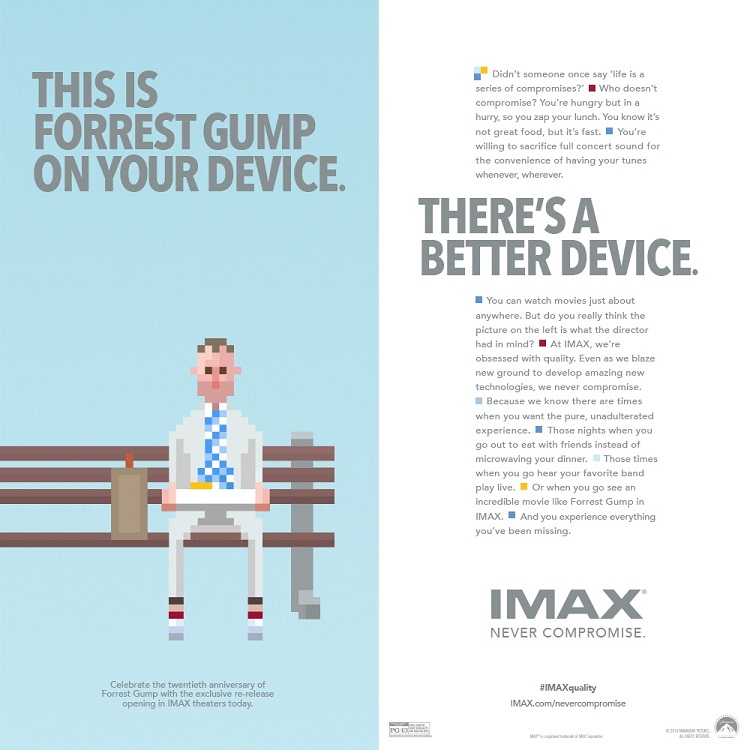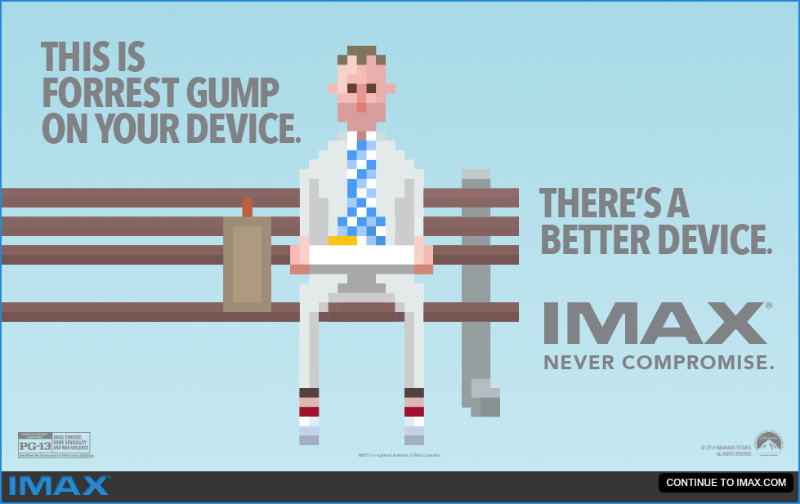|
|
This topic comprises 3 pages: 1 2 3
|
|
Author
|
Topic: Imax Forrest Gump ad
|
|
|
|
|
|
|
|
|
|
|
|
|
|
|
Bobby Henderson
"Ask me about Trajan."

Posts: 10973
From: Lawton, OK, USA
Registered: Apr 2001
|
 posted 09-15-2014 09:22 AM
posted 09-15-2014 09:22 AM




Film may be on its death bed, but it doesn't deserve to be in that position. Digital projection still isn't better than film done right. Video cameras still don't deliver the "film look" and detail of film better than professional motion picture film cameras. There is always some compromise going on somewhere with digital.
Sure, digital video technology may eventually surpass the capabilities of 4-perf 35mm film and perhaps even 5-perf 70mm. But we're not there yet. More video cameras are supporting 4K capture (with some going 5K and 6K), but they need to be doing a whole lot more with color depth. I think that's one of the keys to imitating the film look correctly, especially when the imagery is going to be altered in post production. Unfortunately it will take an obscene amount of data bandwidth and storage to do it right. Basic 8-bit video uncompressed, be it 2K or 4K consumes a hell of a lot of hard disc space.
Another problem is the digital camera sensor designs. Some already have "global shutter" designs, which helps. But why do so many of them need to be 35mm sized? If you have an even bigger camera sensor, like something on the order of a 5-perf 65mm sized film frame, you're going to have bigger pixels, which in turn will be able to see better quality light and color. This is one reason why large format digital cameras capture better image quality than a DSLR and also why DSLR cameras outdo the microscopic cameras in smart phones.
I'm actually concerned high end video camera technology might have hit a glass ceiling along the lines of "it's already good enough." The same may hold true for d-cinema projector technology. Some theaters may go the laser route, but what will get developed beyond that?
The stagnating consumer electronics sector is a big warning sign in all of this. New 4K resolution TV sets aren't selling all that well. One reason is because the electronics companies have yet to come up with a simple effective way of distributing 4K movies in retail. The other reason is most people are 100% satisfied with their current 1080p HDTV. They'll buy a new TV when the current one breaks and can't be repaired several years later. Movie studios are quietly sabotaging Blu-ray and physical media in general. Average Internet speeds are too slow to make 4K streaming practical, at least in terms of delivering content truly 4K in resolution.
It's already been clear that Hollywood has been making movies tailored more for the home HDTV set rather than the big movie theater screen. With that in mind, they might be able to push technology farther to beat film image quality. But why go to that trouble if the current methods are good enough?
| IP: Logged
|
|
|
|
|
|
Bobby Henderson
"Ask me about Trajan."

Posts: 10973
From: Lawton, OK, USA
Registered: Apr 2001
|
 posted 09-15-2014 04:21 PM
posted 09-15-2014 04:21 PM




quote: Terry Lynn-Stevens
Film makers are already using large format digital cameras, the new IMAX digital camera is a using a sensor that is the same size as the image area of a 15/70 film camera.
That needlessly heavy IMAX camera was first used on the latest Transformers sequel. It's hardly qualifies as something in the "filmmakers have already standardized on a bigger image sensor" thing. Seeing how it is made specifically for IMAX' branded films only there's not a whole lot of build-out potential for 3rd party companies, like lens companies such as Zeiss and Angénieux, to support it.
What I'm talking about is getting video camera companies (that aren't attached to IMAX) to move up from arguably small "Super35" sized sensors to at least something like a 5-perf 65mm sized sensor design and then maybe even go proportionately larger than that. It involves more than just coming up with a new sensor though. Entire product lines of lenses have to be developed to support it, and that's probably an even bigger challenge than just coming up with a newer, bigger sensor -even a bigger sensor that supports global shutter operation and other goodies most current sensors lack.
quote: Terry Lynn-Stevens
Agreed, the ceiling on film has already been hit decades ago. Digital projection will continue to get better and better.
I'm not nearly as optimistic about digital. If the drive was really there to make image quality better and better we would already be seeing it on the production and post production end. That isn't happening. 2K is still more common than 4K. With the way physical media has quietly come under attack on the home video front, I strongly suspect an effort to dumb down quality levels. It's as if the lesser quality standards of digital cable and Internet streaming are going to force a "low fi" step backwards.
Meanwhile, the digital fanboys out there are, at some point, going to get a little more irritated having to leap frog huge amounts of precious data from one digital storage device to another, before one storage container (be it a hard drive or data tape) degrades and loses the files it holds forever. This problem is going to be another thing that holds down digital video quality levels. 8K movies? At better than basic color depth? What studio is going to want to pay all that money extra to back up that much more data particularly if they think 2K is good enough?
At least some people are starting to realize it might be a good idea to have an "analog" backup of that high priced movie product. The digital-based archive files are far more volatile and less reliable than a 35mm archival safety print.
quote: Marcel Birgelen
And what makes this ad extra sad is that my "mobile device" has about the same resolution as this frickin' IMAX device...
Actually, if you want to get into real resolution terms, such as pixels per inch ratings, those small devices are a lot higher in resolution that the image blown up on an IMAX Digital screen.
A lot of marketing hype has gone into the high resolution displays in mobile devices like smart phones and tablets. Apple certainly turned the "Retina Display" into a household term. Google then released Nexus tablets with even higher PPI ratings. Several new smart phone models have greater than 1080p resolution displays (2560 X 1440 for instance) and can even shoot 4K video.
| IP: Logged
|
|
|
|
|
|
|
|
|
|
|
|
All times are Central (GMT -6:00)
|
This topic comprises 3 pages: 1 2 3
|
Powered by Infopop Corporation
UBB.classicTM
6.3.1.2
The Film-Tech Forums are designed for various members related to the cinema industry to express their opinions, viewpoints and testimonials on various products, services and events based upon speculation, personal knowledge and factual information through use, therefore all views represented here allow no liability upon the publishers of this web site and the owners of said views assume no liability for any ill will resulting from these postings. The posts made here are for educational as well as entertainment purposes and as such anyone viewing this portion of the website must accept these views as statements of the author of that opinion
and agrees to release the authors from any and all liability.
|

 Home
Home
 Products
Products
 Store
Store
 Forum
Forum
 Warehouse
Warehouse
 Contact Us
Contact Us




 Printer-friendly view of this topic
Printer-friendly view of this topic








![[Roll Eyes]](rolleyes.gif)








